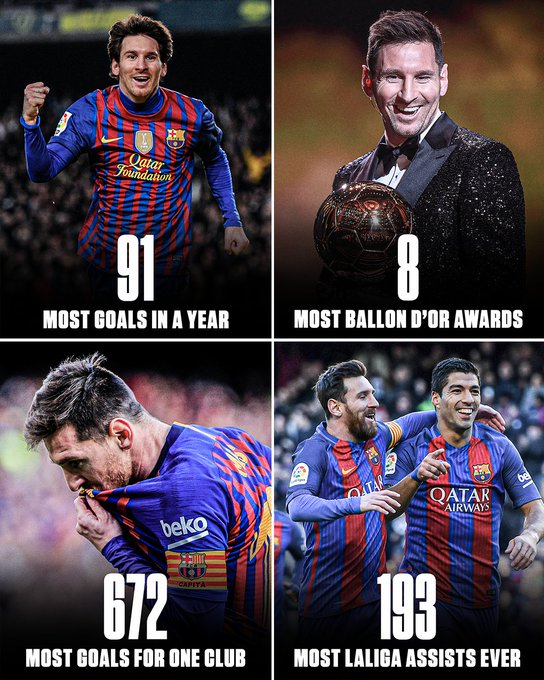Number of Golden Balls, number of goals in a year and a season, number of goals in a tournament, number of consecutive matches scored are solid records of Lionel Messi.
During nearly 20 years of playing at the highest level, Messi won almost every individual and team title, to become the greatest player in history. The career of the Argentine superstar contains records that are almost impossible to overthrow.
Only 10 players have won more than one Golden Ball, and only two of them have won three or more of these awards, Messi and Cristiano Ronaldo. Winning the 2023 vote helps the Argentine striker increase his record to eight times receiving the Golden Ball, after 2009, 2010, 2011, 2012, 2015, 2019 and 2021. Standing closest behind him is Ronaldo – who was honored five times in 2008, 2013, 2014, 2016 and 2017.
In 2012, Messi scored 91 goals for Barca and Argentina. This achievement helped him break legendary Gerd Muller’s four-decade record of 85 goals. Among contemporary players, those with the most goals in a year and behind Messi are Robert Lewandowski (2021) and Ronaldo (2013) with the same 69 goals. This year, Erling Haaland and Kylian Mbappe have 44 and 40 goals respectively. Haaland seems to be having a great season in everyone’s eyes, but the Norwegian striker is still 47 goals short of Messi’s record.
In the 2011-2012 season, Messi set two records for total goals, 73 goals at club level and 82 total goals. For comparison, Ronaldo’s most scoring season with Real was 2014-2015 with 61 goals. If you include the goals from the Portuguese team, Ronaldo ‘s achievement is 66. Gerd Muller scored a total of 67 goals in the 1972-1973 season and Pele scored 66 goals in the 1957-1958 season. Messi’s achievements, therefore, are very difficult to catch.
For 20 years, one of the common questions in La Liga has been whether anyone will surpass the goalscoring record shared by Telmo Zarra and Hugo Sanchez. They scored 38 goals in the 1950-1951 and 1989-1990 La Liga seasons respectively. Since 2010, Cristiano Ronaldo surpassed that figure three times, Messi three more times and Luis Suarez another time. The person who broke the record the most was the Argentine superstar, with 50 goals in the 2011-2012 season. Ronaldo once reached the milestone of 48 goals, in the 2014-2015 season.
19 consecutive matches scoring at least one goal
Once again, the significance of the record is measured by comparing its holder with the second and third, Ronaldo Nazario and Cristiano Ronaldo, who scored in 10 consecutive matches. Messi scored in 19 consecutive matches in the 2012-2013 season. The record was interrupted due to injury, so it could have been even higher. In fact, when he recovered, Messi scored again in the next two matches, raising his record to scoring in 21 consecutive matches.
Before Messi and Ronaldo appeared, the player with the most goals in La Liga history was Telmo Zarra, who is currently ranked third. The legendary striker of Athletic Bilbao scored 252 goals. This number becomes small when placed next to Messi’s record of 474 goals. The former Barca striker scored 163 more goals than the second person (Ronaldo) and 222 more goals than the third person. In other major tournaments, the top scorers in tournament history are also many goals behind Messi. In the Premier League, Alan Shearer has 260 goals, in Serie A it is Silvio Piola with 274 goals, in the Bundesliga it is Gerd Muller with 365 goals and in Ligue 1 it is Delio Onnis with 299 goals.
Some of Messi ‘s other hard-to-break records are winning the European Golden Shoe six times, 106 matches for Argentina, 26 matches at the World Cup or winning the World Cup Golden Ball twice. In La Liga, the Argentine superstar also has other solid records such as winning the most matches (383), scoring one or more goals in the most matches (300), number of matches with at least two goals (133), number match with at least three goals (36), number of collective titles (44) or the most goals for a club (672 goals for Barca).
News
Lưu Hương Giang quyết định cho Hồ Hoài Anh cơ hội sau ‘Đạp gió rẽ sóng’. Nữ ca sĩ liền báo có tin vui👇
Lưu Hương Giang quyết định quay về với gia đình sau ‘Đạp gió rẽ sóng’ Ca sĩ Lưu Hương Giang đã không buồn khi phải chia tay…
Selena Gomez reflects on her body’s changes in throwback swimsuit photos: ‘I will never look like this again’
Selena Gomez has opened up about her appearance while candidly reflecting on her body’s changes throughout the years. Taking to her Instagram Story Monday night, the actress/singer showed her…
Selena Gomez takes a bite of boyfriend Benny Blanco’s cake in suggestive photo
Selena Gomez shared a suggestive snap eating a cake depicting boyfriend Benny Blanco.Selena Gomez/Instagram Selena Gomez can’t keep her mouth to herself. The singer took a bite…
Justin Bieber’s mom reacts to rumors Hailey is pregnant with twins
Justin Bieber’s mom had to clarify how many babies her son and daughter-in-law are having after sparking rumors that they could be expecting twins. After the Rhode founder’s…
Selena Gomez explained why she disabled Instagram comments just days before Hailey Bieber’s pregnancy news
No need to “Kill Em with Kindness” — Selena Gomez’s haters can’t even comment on her social media uploads. The actress explained her decision to limit her…
Selena Gomez flaunts Benny Blanco romance after Justin and Hailey Bieber’s pregnancy announcement
Selena Gomez flaunted her relationship with Benny Blanco after Justin and Hailey Bieber revealed they were expecting their first child.Selena Gomez/Instagram Selena Gomez showed off her romance with…
End of content
No more pages to load














